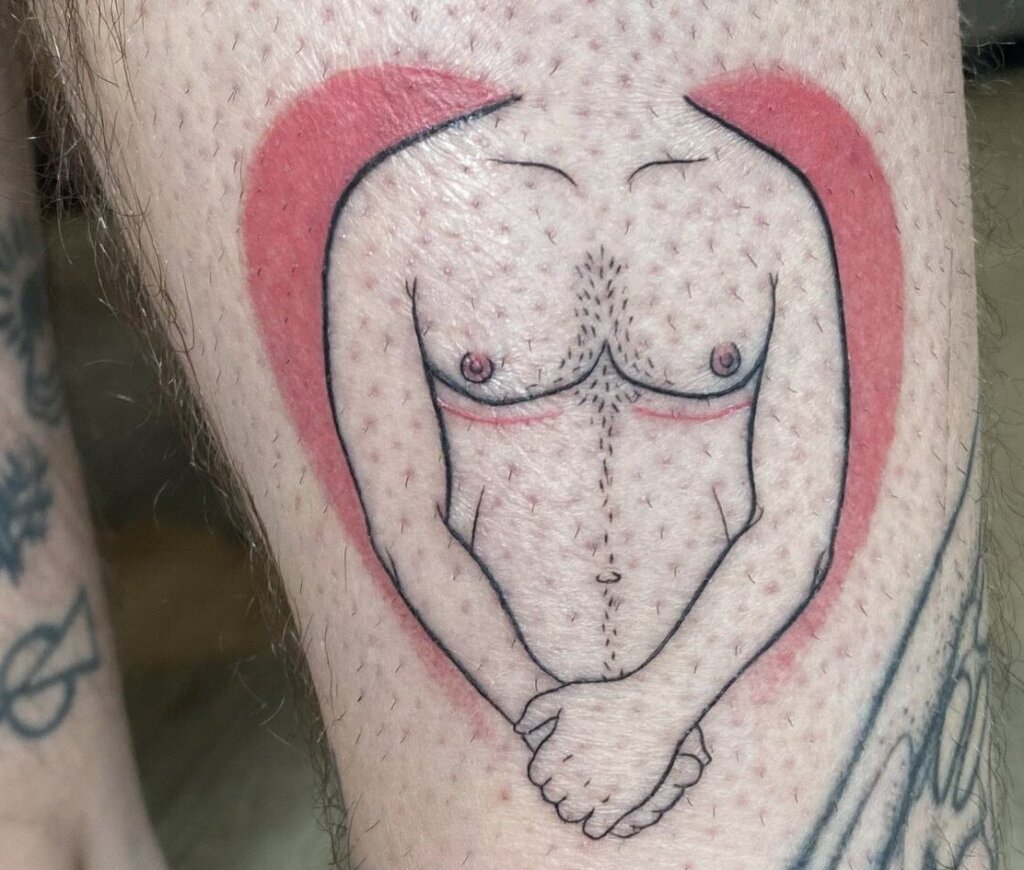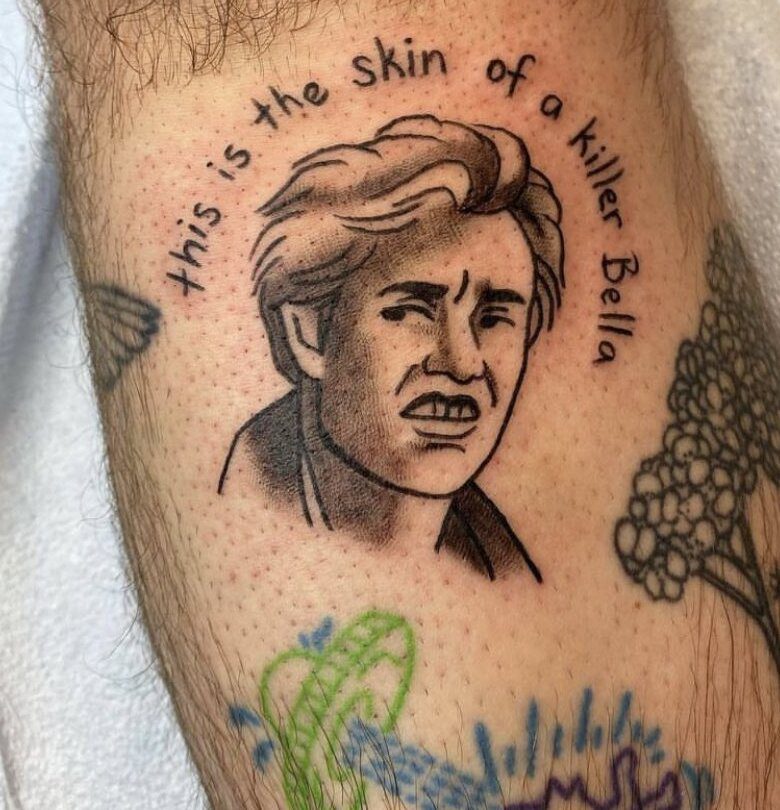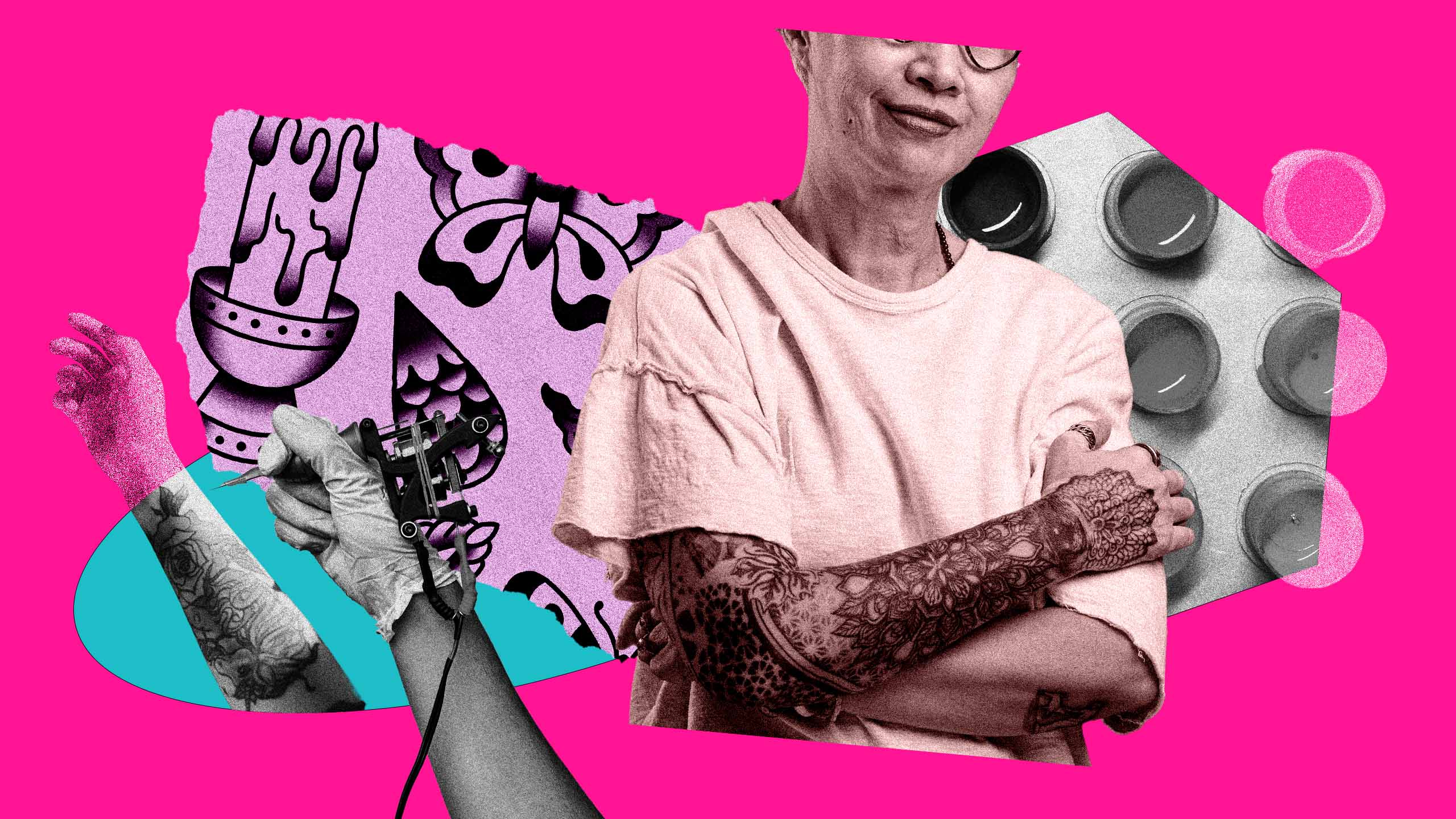From pink triangles to pansies, pop culture to politics, tattooing and queerness go hand in hand. This essay introducesQueer Ink, a seven-part series on queerness and tattooing, where we’ll dive deep into the ways that queer and trans people use tattooing to embody ourselves and identities.
Over the past century, tattoos have evolved from something for the military, to a mark of criminals and degenerates to, in recent decades, a popularized form of self-expression. A third of Americans have at least one tattoo, and some boast a whole lot more.
And along the way, they’ve also become super queer. Walk into any queer space—be it a bar, a health clinic or a bookshop—and you’ll likely spot an assortment of creative ink gracing the skin of the patrons. Maybe it’s bold lettering of a simple word, images of queer history or moments like marriages or memorials captured forever in ink.

A tattoo of a torso with top surgery scars, done by @MrLauder in Vancouver. Credit: Mel Woods
At last count I have around 37 tattoos (give or take a few), a patchwork of art compiled over a decade. I have travel tattoos (a Keith Haring tribute from a solo trip to Berlin, a duck from a work trip to Toronto) and tattoos I did myself (a hand-poked experiment done in my own bathroom during the early pandemic months, another done in a room full of friends while we watched Mulan). I have pop culture tattoos (tributes to Kate Bush, Portrait of a Lady on Fire, The Favourite and, yes, Twilight) and nature tattoos (so many flowers). Because, of course, they’re permanent, I still have my very first tattoo (a Margaret Atwood quote) and my most recent (a torso with top surgery scars).
Each one is a little entry in the scrapbook of my life, forever marked on my body. What they are matters, but for me it’s more about when I got them and what chapter of my life they mark. Coming out (twice), medical transition, heartbreak, friendship … I can point to the permanent markings when they all happened. And over the years I’ve met and been tattooed by friends, community members, myself and yes, a lot of queer folks. I’ve been tattooed in basements and lofts and friends’ apartments.
I almost certainly will get more tattoos in the months and years to come, and they’ll age alongside me just the same as the laugh lines around my eyes or the burgeoning silver strands in my hair on my temples. Sure, they may fade or blur or sag, but they are part of me and my story forever.
And I’m not alone in that. Queer and trans people have long gotten tattoos to mark milestones in their personal lives, commemorate queer history, to be a part of weird underground camp culture. In the mid-20th century, nautical star tattoos on the wrist—tastefully hidden under a watchband—served as a signal between lesbians. Queer people have long embraced the image of an upside down pink triangle as a reclamation of the symbol used by the Nazis to flag gay people during the Second World War. And even simply today, tattoos can serve as a sort of mating call between eligible queers—an unspoken beacon that says “yup, I’m fruity.”

A tattoo of Edward from “Twilight,” done by @zebrafiinches in Vancouver. Credit: Mel Woods
In recent years, new collectives, artist groups and communities have sprung up, bringing together queer and trans folks and moving forward as a way to push back against some of the traditional cishet masculinity of tattoo shops. Worker-owned spaces and community care have become tenets of many tattooing practices. Here in Vancouver, where I live, queer-run tattoo shops and artist collectives like Homebody Tattoo, Baohaus Collective and others are as much a part of our local culture as music venues, art galleries or cultural festivals.
Queerness is in so many ways about self-determination. We choose to live our lives out and proud, to love whom we want to love and to present in the world how we want to present. Whether it’s a single dangly earring or an orange, patterned button-up or a mullet or platform go-go boots, we’ve long signalled our queerness to the masses through our physical appearance. No matter what the world says we should look like or be, we choose to forge our own path: and in many ways tattooing is like that too.
Just as I chose to have two wide top surgery scars cut a landscape across my chest, so too did I choose to have a portrait of Edward Cullen with the text “this is the skin of a killer Bella” on my leg. To quote Walt Whitman: I am large, I contain multitudes.
Queerness and tattooing are incredibly linked, and that’s from where this series is born. So join me in reveling in queerness, joy, ink and community as we take a trip through the world of inked queers. Who knows, it might just inspire your next tat.
Inside the Queer Ink series …
Series editor Mel Woods introduces the history behind queer and trans people and tattooing, and dives into how tattooing has played a key role in their own life and identity. (Oct. 2, 2023)
Lindsay Lee Wallace explores the A Thousand Pansies Project, an initiative to use tattooing as queer collective care. (Oct. 4, 2023)
Xtra staff share the stories behind some of our own gayest tattoos. (Oct. 10, 2023)
Adam Rhodes dives deep into erotic tattoos and the queers who choose to get them. (Oct. 12, 2023)
BJ Ferguson explores the world of post-op top surgery tattoos. (Oct. 17, 2023)
Julia Peterson profiles some of the Two-Spirit tattooers using the artform to express and explore identity.
Next up: Later this week, meet the tattoo artist who’s set out to tattoo 1,000 pansies—and find out why they’re doing it.


 Why you can trust Xtra
Why you can trust Xtra


